Clothesline Project hangs sexual violence out to dry
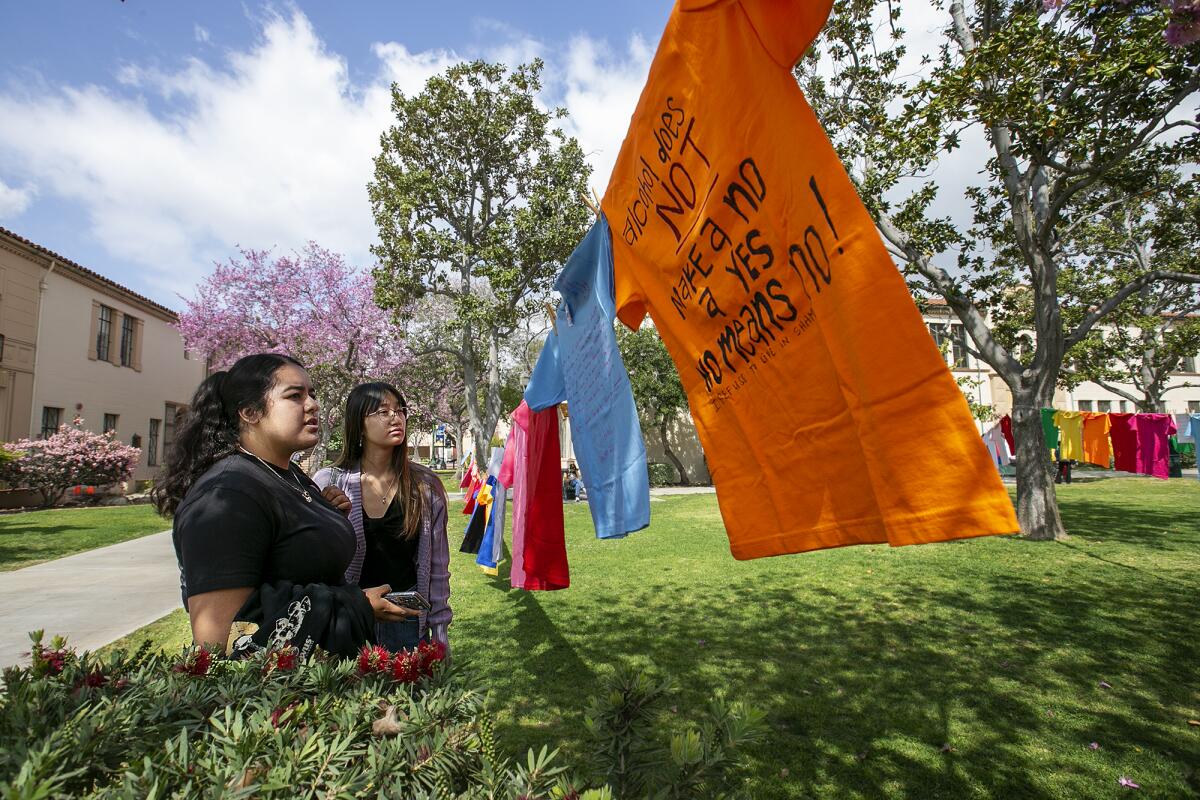
- Share via
Colorful T-shirts hanging on a clothesline in the main quad at Fullerton College looked festive from afar, but as students got closer, they were met with a somber message.
“You made me afraid to go to school at age 13,” one blue T-shirt read.
“You were my teacher. That did not give you the right,” a black T-shirt stated.
The T-shirts are part of an impactful installation hosted by the nonprofit Waymakers for sexual assault awareness month, recognized in April.
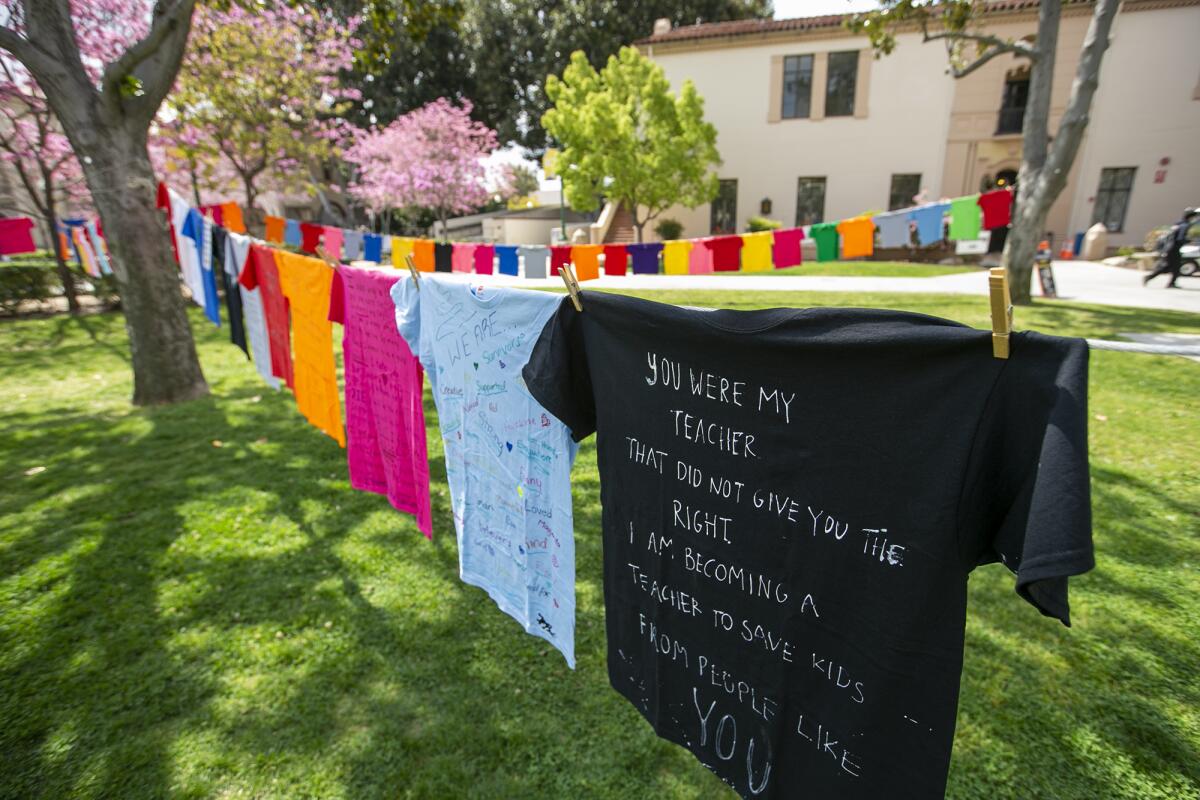
“The Clothesline Project is a display made by survivors,” said Vanessa Reyna, program coordinator at Waymakers.
Defined as “sexual activity when consent is not obtained or freely given,” sexual violence is common, according to the Center for Disease Control and Prevention. More than half of women and almost one in three men have experienced sexual violence in their lifetimes, and one in four women and roughly one in 26 men have experienced completed or attempted rape, the agency says.
Waymakers is an Orange County-based organization that offers individuals, families and communities programs, services and resources to provide “pathways to promising outcomes.” That involves sheltering children, supporting victims, resolving conflicts and educating communities. Waymakers has victim advocates at every courthouse in Orange County and also runs the Orange County’s rape crisis center, with a 24-hour hotline.
“Our main mission is to be able to build safer communities,” said Reyna. “We do offer a variety of high-quality counseling and supportive services to people that are experiencing crisis in Orange County.”
The Orange County Clothesline Project, which began in 2001, is one example of Waymakers’ community outreach.
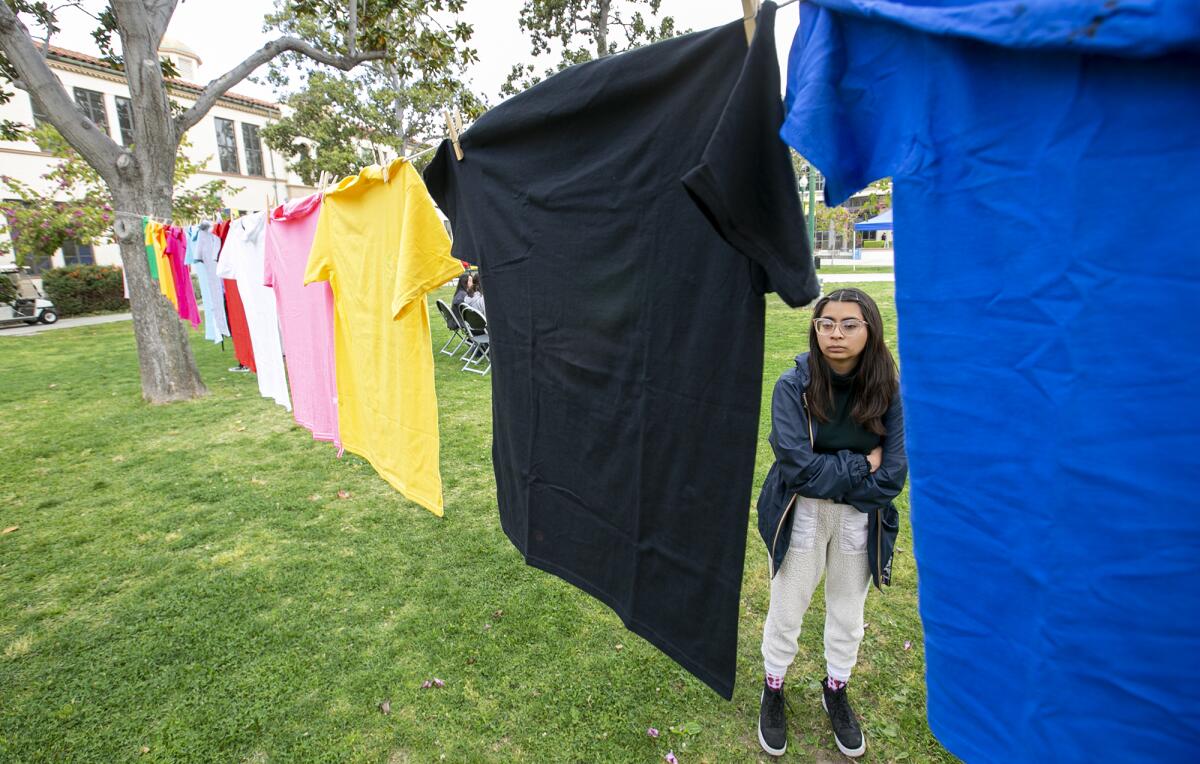
The colors of each shirt signify a different crime. Red, pink and orange shirts signify rape, while green and blue signify child sexual abuse. Gray signifies human trafficking, purple signifies rape due to sexual orientation and black signifies sexual harassment. White stands for homicide and yellow signifies domestic violence. Survivors pen handwritten messages on shirts colored to match the crime they experienced. The stories are written on the shirts anonymously.
“What is so powerful about this display is that it does give a voice to survivors in a safe way,” said Reyna. “Year after year, we see survivors make a T-shirt and we display it that day and then put it away and it gets added to the display. So it is a work in progress.”
The Clothesline Project began with just eight T-shirts. Now in its 22nd year, the project has over 1,200 multicolored T-shirts. The project is touring Orange County universities where students can view the display and write on a T-shirt of their own. Its first stop was at Cal State Fullerton on April 13 before coming to Fullerton College on April 18, where student Daniela Salgado solemnly read each T-shirt.
“I believe this exhibit is super important … it is important to shine light on the different types of sexual assault,” said Salgado. “Children, human trafficking, the deaths. This is important for us to learn because I think we are shielded all our lives and we just hear, ‘Oh this was a bad case,’ but we have the resources to learn how to deal with it, prevent it and bring awareness.”
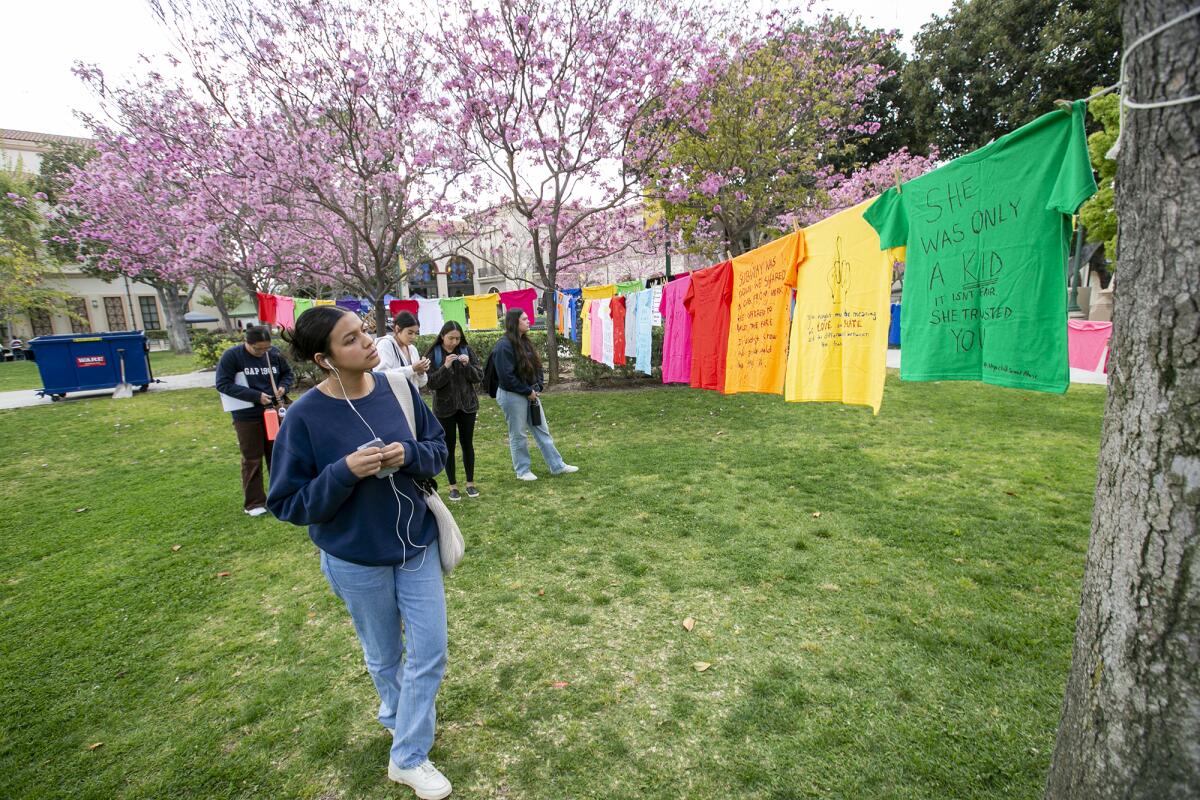
Student Johnathan Pena was surprised to see so many stories of abuse began when the victims were young, at the hands of a family member.
“The ages between 15 and 16 seem to be the most common ages,” said Pena. “What shocks me the most is sometimes it was coming from their own family. It’s eye-opening.”
According to the CDC, more than four out of five female rape survivors reported that they were first raped before age 25 and almost half were first raped as a minor.
Accompanying the clothesline installation at each campus is a Waymakers booth with information about the services the organization offers, prevention and what to do if someone is a victim of sexual assault. The Clothesline Project aims to open the conversation.
“I think there is a lot more education and awareness, and we are slowly starting to shift the culture to make it acceptable to have these conversations in general, ” said Reyna. “So that the conversation around sexual violence is no longer taboo.”
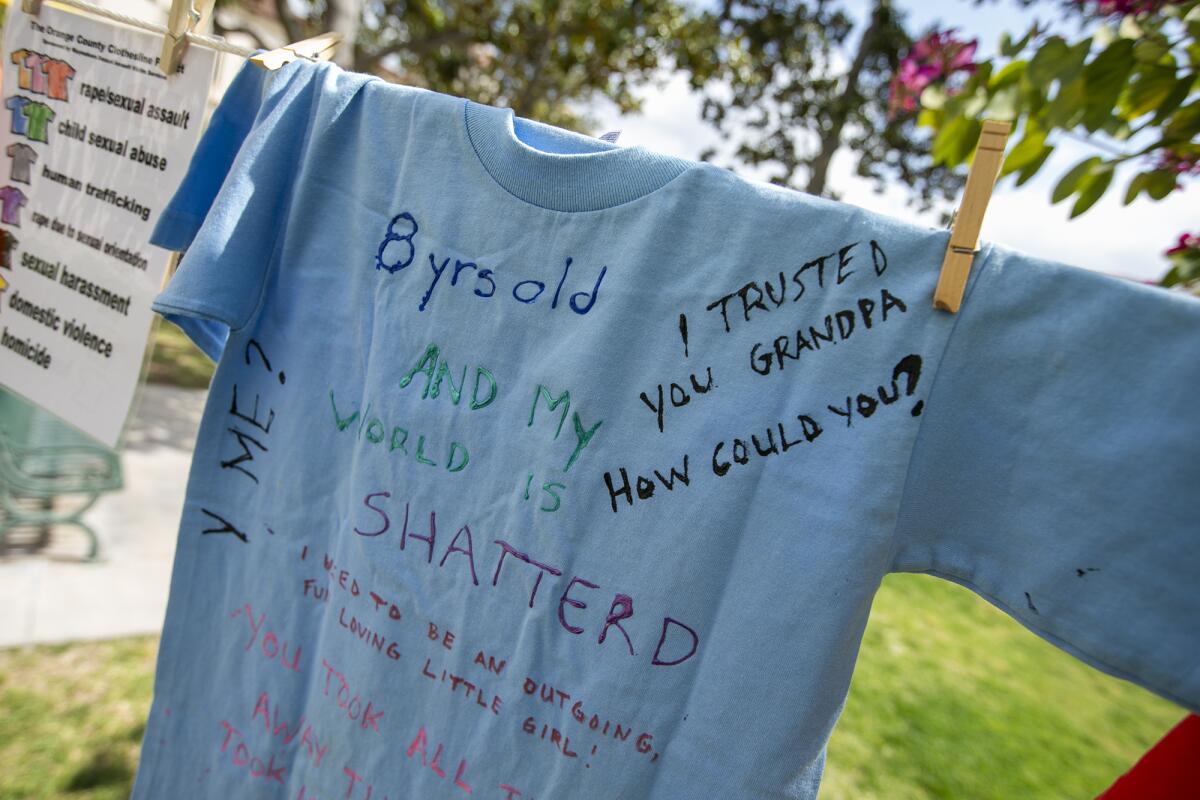
Reyna said that doesn’t mean every survivor is ready to talk about their experience.
“One of the things that is important to be mindful of is that no matter how safe the environment we create and how open we are to dialogue, that doesn’t mean the survivor is ready and willing to talk about their story,” Reyna said. “But it is a best practice to have these ongoing conversations so that those who are debating about sharing their story feel comfortable and supported.”
The conversations sparked by the Clothesline Project can also contribute to prevention, especially on a college campus, organizers said.
“It is a great opportunity to continue to educate those who are just entering adulthood,” said Reyna.
The conversations surrounding prevention are also shifting, with safety guidelines not only being directed at young women but young men too.
“It is important to educate youth at this age level to not commit sexual assault,” said Reyna. “Before, we had a lot of conversations about watching your drink, the buddy system and watching what you wear.”
Reyna said all those tips can reduce risk of assault, but at some capacity that line of thinking shifts blame to the victim.
“That is not the responsibility of a victim, ever. So now we are trying to create opportunities to provide education about not committing sexual assault, being mindful of what consent is and understanding if you are not honoring that, you are committing an act of violence.”
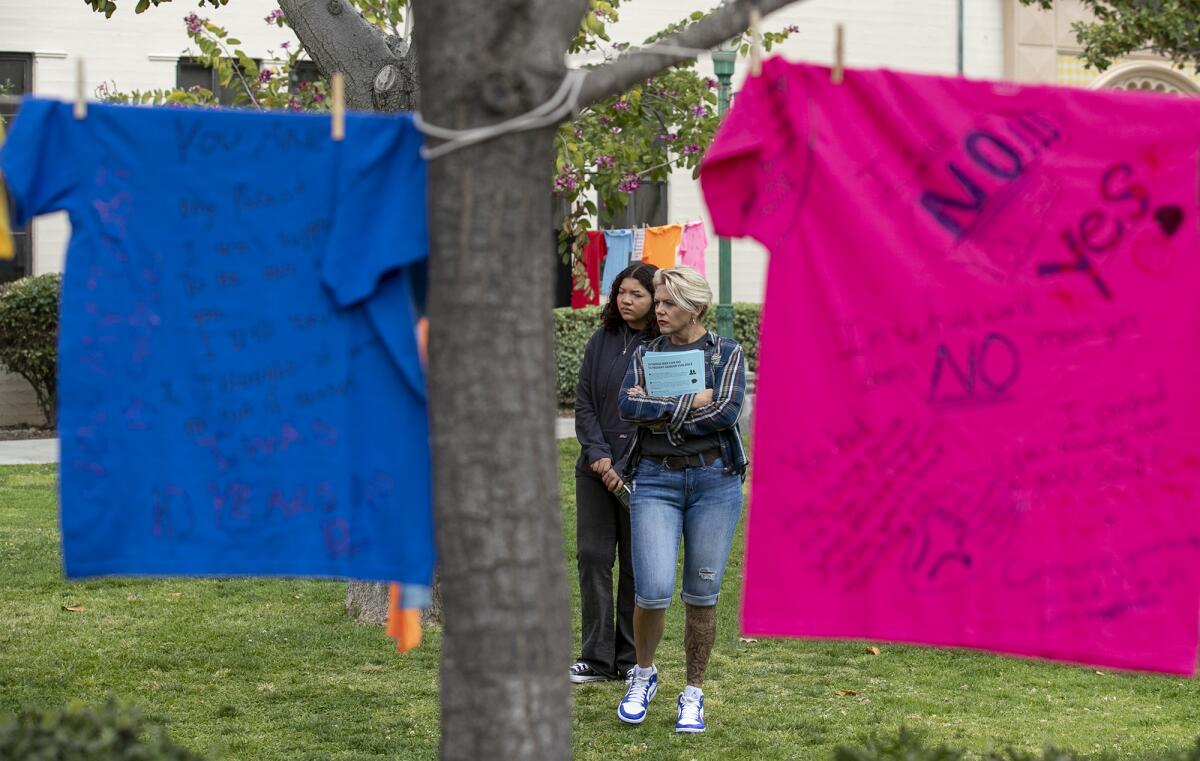
Salgado said she appreciated seeing prevention materials directed at young men in addition to young women.
“They are handing out fliers on what men can do, especially, to prevent all of this,” said Salgado.
The Clothesline Project will make its way to Irvine Valley College on April 25 followed by Cypress College on April 26.
Having been with Waymakers for 15 years, Reyna has experienced the impact the Clothesline Project can have firsthand.
“I have witnessed survivors make their shirts, and then they have come and joined us at different events years later and look for their shirt to see if it is still there,” said Reyna. “And they have this moment of remembering when they made it and where they were at, and being so proud of where they are now.”
All the latest on Orange County from Orange County.
Get our free TimesOC newsletter.
You may occasionally receive promotional content from the Daily Pilot.




